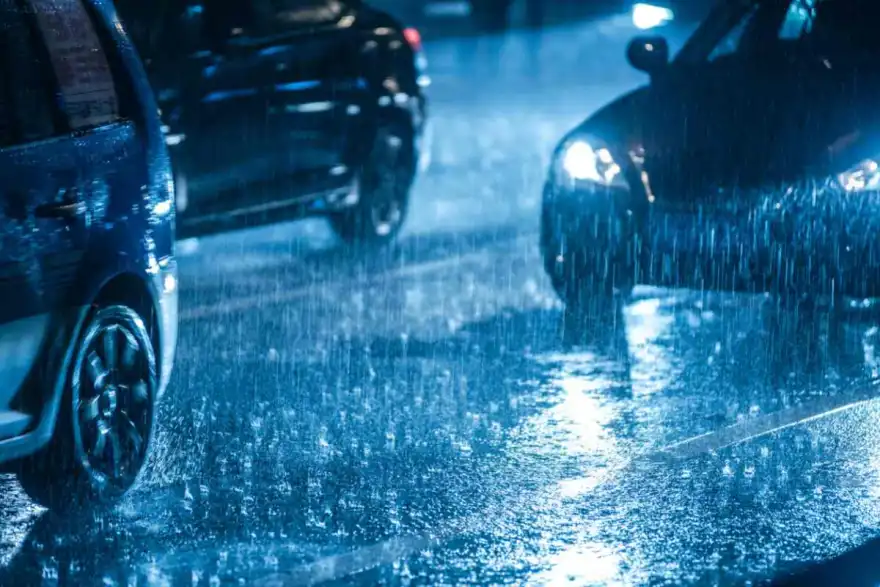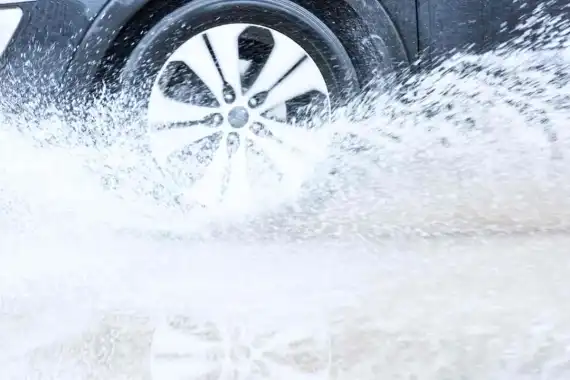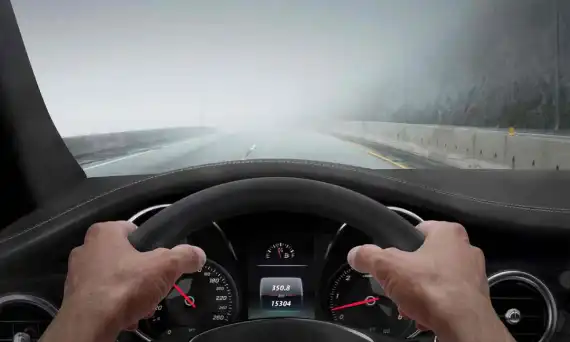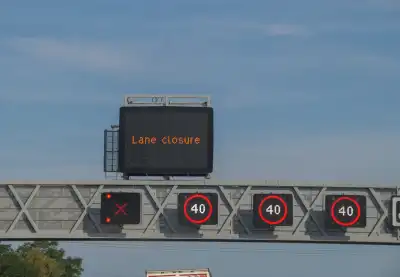
Okay, it's a first-world problem, and let's face it, living in Britain means we should be used to driving in a deluge. But why does a downpour constantly interrupt the flow of traffic? Is it because we're all wimps and dive into our cars to get somewhere we could otherwise walk to? Sometimes that's the case, I'm sure. Also, some folk drive like they're at the tiller of a boat rather than at the wheel when the highways and byways start to run with water.
And while I’m at it, what is it about the inability to switch car lights on during inclement weather? It is incredible how many motorists fail to grasp the fact that it’s easier to be seen when lights are switched to ‘on’. It is not that difficult.
As for the spray from lorries and the car windows fogging up – well, it’s not only potentially dangerous, but it can do your head in and leave you in a bad mood by the time you get to your destination – wherever that may be. Or maybe all this is just me after a particularly exasperating morning driving in rain that was coming down like stair rods.
But really, I mustn't grumble, even though I suspect most of us end up muttering some unmentionable words on rainy roads in heavy traffic. To be fair, I think the soggy journey did me a favour. It got me thinking about sharing some tips on driving in wet weather. So, take heed – because then we might still get to our destinations safely and in good time – without letting a bit of water send us all into a motoring meltdown!
Tyres
Before anything else, you need to check your tyres. To put it bluntly, without properly inflated tyres and a good amount of tread, you aren't set up for driving anywhere, let alone in the rain. So, set the correct pressure, and know that the more tread you have, the safer you – and everyone else in your car - and on the road - will be. The law in the UK states the tyre tread depth must be at least 1.6mm – but that’s the bare minimum. And why would you want to motor around at the razor’s edge of safety? You're playing Russian roulette. When you think that the tread helps clear the water between the tarmac and the tyre, it's a no-brainer that the deeper the tread, the superior the grip on the road.

Steamy windows
Have you noticed your car’s windows steam up when it’s pelting down? To state the patently obvious, fogged-up windows reduce your visibility, making driving unsafe. Many vehicles have a demist setting that will clear the interior of the windscreen and other windows. Alternatively, rolling your windows down a bit can help get your windscreen clear. Okay, the rain will get you a little wet – but it’ll be worth it to be able to see – and it won’t make you rusty – promise! Besides, demisting isn’t a choice – it’s something you must do by law here in the UK. Legally, you have got to be able to have a clear view of the road before setting off. Did you read that? That's right, get your windows clear before you start thinking about getting those wheels rolling.
Slow down
Once on the move, the primary and most crucial recommendation is to slow down. Yes, that’s another reason for a rainy trip to turn into a longer one potentially, but it's essential you don’t drive like a bat out of hell in the wet. Hurtling along the asphalt too quickly and too close to other motors in a cloudburst will slash your visibility further. The vehicle spray will affect you, and you could even lose traction on the soaked and slippery tarmac. What’s more, you won’t be able to stop in time if he or she in front slams the anchors on. Therefore, when you relax your accelerator pedal, you’ll instantly be able to see and react better because the raindrops aren't hammering against your windscreen quite so brutally. But, again, it is just common sense – not rocket science!
Ensure your wipers are effective
It may seem a blindingly obvious tip, but make sure your windscreen wipers are fit for purpose. If they’re old or worn, then get new ones fitted. If it's beyond you to do it yourself, go to a garage or a car parts store and ask a worker to fit new wiper blades. You see, a common problem drivers have when journeying in a downpour is considerably decreased vision because of worn-out wiper blades (the rubber bits on the wiper arms). If your wipers need changing, you’ll find they’ll smear your windscreen rather than clearing it properly. This further obscures your view, putting you and other road users at risk.
Switch your lights on
If your windscreen wipers are swish-swashing across the glass in front of you, your lights – front and rear should be illuminated, too. Switching your car lights on – (don’t just rely on automatic headlights) will help improve your visibility in the rain, making it easier for other cars and lorries to see you. In addition, it will make you feel safer and potentially help avoid an accident when it's challenging to see through a torrent of water.
Prepare for aquaplaning
You really don’t want this to happen, but it can. We are talking aquaplaning here. This is when your car isn’t responsive to steering for a bit. It can occur when the water between the tyre and the tarmac builds up, and the rubber and road lose contact with each other. Basically, you’re a passenger on a film of water. If you do lose control of your vehicle, you tend to want to overcorrect your steering or brake. But don’t! It is one of the ways to really lose control. Instead, ease your foot off your car’s throttle. Braking will be in vain because your tyre has already lost traction with the surface of the road. Moreover, abruptly altering your steering could cause your car to spin. Got it? Good.

Don’t use cruise control
If your motor is fitted with cruise control, you might be tempted to use it because travelling at a set pace seems like a safe bet. Right? Wrong! You see, when it’s bucketing down, using cruise control is a seriously bad idea. Why? Well, if your vehicle starts to aquaplane while you’re using that technology, your car can speed up. This is the last thing you need and could prove catastrophic for you and other road users. Furthermore, cruise control can relax you and tempt your feet away from the car’s pedals on a long trip. This is downright dangerous at the best of times, let alone when you’re travelling in the pouring rain.
Avoid Puddles
This piece of advice may seem as obvious as the nose on your face but try to stay away from large puddles when you're motoring. Avoiding standing water is only sometimes possible, though, and it's not always safe to do so. Therefore, when you see a lot of water on the road ahead, and you've no choice but to carry on, slow down. If you don’t drop your pace, you risk aquaplaning. In addition, motoring through deep puddles isn’t great for your car’s mechanical bits. No, the engine won’t thank you at all. Come to think of it, nor will the brakes.
This advice article is by no means exhaustive, but hopefully it serves as a reminder that we shouldn't get caught out by the "good old" British weather. Remember, precipitation can soon turn precarious. So, rein in the anger next time everyone's driving too slowly or during rain-induced hold-ups. After all, it’s better to arrive late than never to arrive at all.




